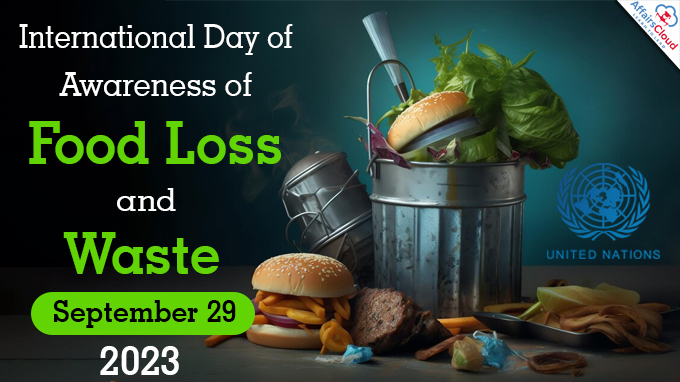 The United Nations (UN) International Day of Awareness of Food Loss and Waste (IDAFLW) is annually observed across the globe on 29 September to raise awareness of the importance of the food loss and waste issue and promote global efforts towards resolving it.
The United Nations (UN) International Day of Awareness of Food Loss and Waste (IDAFLW) is annually observed across the globe on 29 September to raise awareness of the importance of the food loss and waste issue and promote global efforts towards resolving it.
- The day is co-convened by the Food and Agriculture Organization of the UN (FAO) and the United Nations Environment Programme (UNEP).
- 29 September 2023 marks the observance of the 4th IDAFLW.
The theme of IDAFLW 2023 is “Reducing food Loss and waste: Taking Action to Transform Food Systems”.
- The 2023 theme calls for the action to reduce food loss and waste (FLW) toward transforming agrifood systems to contribute to the achievement of the 2030 agenda.
Background:
i.On 19 December 2019, the United Nations General Assembly (UNGA) in its 74th session adopted the resolution A/RES/74/209 and designated the 29 September of every year as the International Day of Awareness of Food Loss and Waste.
- The resolution recognizes the fundamental role that sustainable food production plays in promoting food security and nutrition.
ii.The first IDAFLW was observed on 29 September 2020.
Significance:
i.The target 12.3 of Sustainable Development Goal (SDG)12 emphasises halving per capita global food waste at both the retail and consumer levels while reducing losses along production and supply chains.
ii.Target 16 (Sustainable consumption choices are enabled, and food waste reduced by half) of the Kunming-Montreal Global Biodiversity Framework (GBF) also calls for “halving global food waste by 2030”.
- Efforts in line with the SDG 12.3 target and GBF Target 16 will promote progress in transforming agrifood systems, benefiting both humanity and the environment.
iv.The 2 Sub-Indicators of the SDG 12.3 target are the Food Loss Index (FLI) and Food Waste Index (FWI).
Food Loss and Waste (FLW):
i.The disposal of FLW in landfills, leads to Green-House Gas (GHG) emissions, contributing to climate change.
ii.FLW can also negatively impact food security and food availability, and contribute to increasing the cost of food.
iii.Reducing FLW can address some of the world’s most pressing issues: poverty, hunger, and climate change.
Key Facts:
i.According to the FAO 2023, between 691 and 783 million people faced hunger in 2022, with a mid-range of 735 million.
ii.According to the FAO 2022, globally, around 13% of food produced is lost between harvest and retail.
iii.According to UNEP 2021, an estimated 17% of total global food production is wasted in households, in food service, and in retail altogether.
iv.According to the UN:
- Food that is lost and wasted accounts for 38% of total energy usage in the global food system.
- FLW is responsible for approximately 7% of global GHG emissions and nearly 30% of the world’s agricultural land is currently occupied to produce food that is ultimately never consumed.
- Packaging now contributes approximately 5.4% of global food-system emissions, more than any other supply-chain factor including transportation.
2023 Events:
FAO and UNEP organised a webinar on 29 September 2023, about stopping food loss and waste for the people and for the planet to commemorate the 2023 IDAFLW.
About Food and Agriculture Organization (FAO) of the UN:
Director-General– QU Dongyu
Headquarters– Rome, Italy
Established in– 1945




